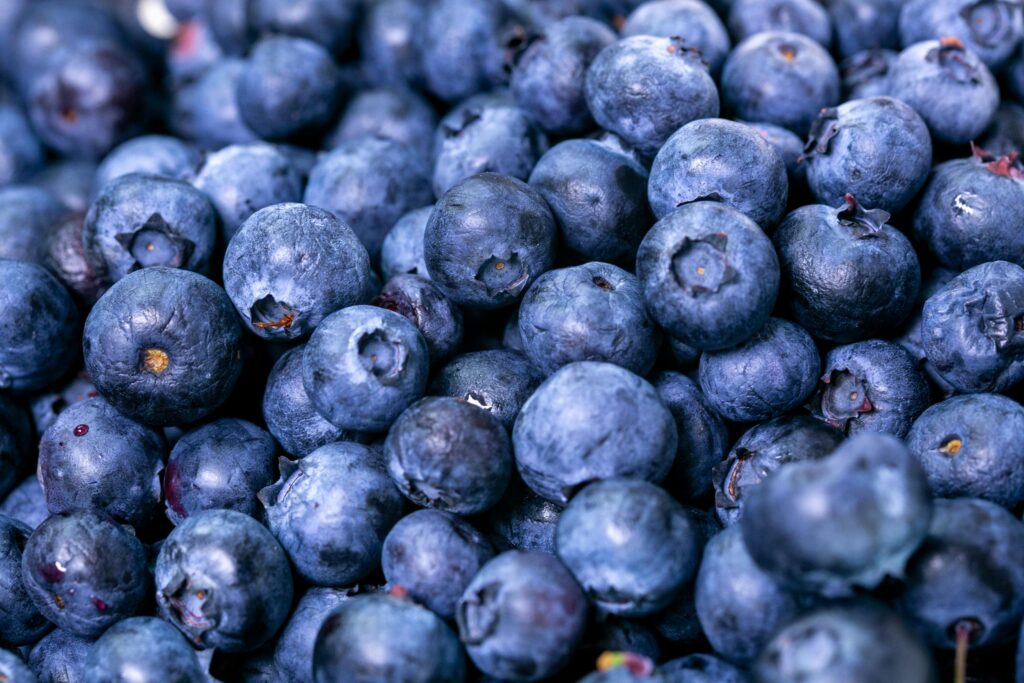When you hear the term “Blueberries Considered to Be a Superfood,” what comes to mind? Kale, quinoa, maybe chia seeds? Make some room for blueberries, these tiny fruits pack a nutritional punch that earns them a top spot on the superfood list. But why exactly are blueberries considered a superfood? Let’s dive in and find out.

Table of Contents
Nutritional Profile of Blueberries
Blueberries are not just delicious; they’re also incredibly nutritious. They are low in calories but high in vitamins, minerals, and antioxidants, making them an excellent choice for anyone looking to boost their health.
Vitamins and Minerals
Blueberries are a rich source of essential vitamins and minerals, including:
- Vitamin C: An antioxidant that helps protect cells from damage and supports the immune system.
- Vitamin K: Important for blood clotting and bone health.
- Manganese: Essential for metabolism, bone development, and wound healing.
Antioxidants
Blueberries are famous for their high antioxidant content. These compounds help neutralize harmful free radicals in the body, reducing oxidative stress and lowering the risk of chronic diseases. Key antioxidants found in blueberries include anthocyanins, flavonoids, and resveratrol.
Fiber Content
Fiber is crucial for a healthy digestive system, and blueberries provide a good amount of it. A cup of blueberries contains about 4 grams of fiber, which helps promote regular bowel movements and feeds beneficial gut bacteria.
Can Blueberries Considered to Be a Superfood?
The nutritional components of blueberries contribute to a wide range of health benefits, making them a powerhouse of goodness.
Rich in Antioxidants
Antioxidants are like the body’s defence system against damage from free radicals, and unstable molecules that can harm cellular structures. Blueberries are particularly high in anthocyanins, the antioxidants responsible for their deep blue colour. These compounds help reduce inflammation and protect against various diseases.
Boosts Brain Health
Several studies have shown that Blueberries Considered to Be a Superfood and can improve brain function and delay age-related cognitive decline. The antioxidants in blueberries are thought to combat oxidative stress and inflammation, which are factors in brain ageing and neurodegenerative diseases.
- Studies on Blueberries and Cognitive Function: Research indicates that consuming blueberries regularly can enhance memory and learning capabilities. In one study, older adults who consumed blueberry juice showed significant improvements in memory compared to a control group.
- Mechanisms of Action: Blueberries’ benefits for brain health are believed to come from their ability to increase brain-derived neurotrophic factor (BDNF), This protein supports the growth and maintenance of neurons.
Supports Heart Health
Heart disease is the leading cause of death worldwide, but blueberries can help keep your heart healthy.
- Impact on Cholesterol Levels: Blueberries have been shown to lower levels of LDL (bad) cholesterol, which can clog arteries and lead to heart disease.
- Effects on Blood Pressure: Regular consumption of blueberries is associated with reduced blood pressure, likely due to their high polyphenol content.
Aids in Digestion
The fiber in blueberries is not only good for regularity but also acts as a prebiotic, feeding the beneficial bacteria in your gut. This can lead to a healthier digestive system overall.
- Prebiotic Properties: Blueberries promote the growth of healthy gut bacteria, which can improve digestion and absorption of nutrients.
Improves Skin Health
Blueberries can give you a glowing complexion from the inside out.
- Nutrients Beneficial for the Skin: Vitamins C and E, both found in blueberries, are known for their skin-healing properties. They help repair damage caused by the sun and environmental pollutants.
- Antioxidants and Skin Protection: The antioxidants in blueberries protect your skin from oxidative damage, which can cause premature ageing.
Helps in Weight Management
Trying to lose weight? Blueberries might be your new best friend.
- Low-Calorie Content: With only about 84 calories per cup, blueberries are a guilt-free snack.
- Satiety Factor: The fiber content helps you feel full longer, reducing overall calorie intake.
Blueberries in the Diet
Incorporating blueberries into your diet is easy and delicious.
Fresh vs. Frozen Blueberries
Both fresh and frozen blueberries are nutritious, but there are a few differences to consider.
- Nutritional Differences: Fresh blueberries are slightly higher in vitamins, but frozen blueberries are often more convenient and can be stored longer without losing their nutritional value.
- Convenience and Storage: Frozen blueberries are a great option if you want to enjoy this superfood year-round. They can be easily added to smoothies, baked goods, and other dishes.
Incorporating Blueberries into Meals
There are countless ways to enjoy blueberries. Here are a few ideas:
- Breakfast Ideas: Add blueberries to your morning cereal, oatmeal, or yogurt for a burst of flavor and nutrition.
- Snacks and Desserts: Enjoy blueberries on their own as a snack, or use them to top off ice cream, pancakes, or waffles.
- Savory Dishes: Blueberries can even be incorporated into savory dishes like salads, sauces, and glazes for meats.
Blueberries and Disease Prevention
Blueberries aren’t just good for general health—they may also help prevent certain diseases.

Cancer Prevention
The antioxidants in blueberries, especially anthocyanins, have been shown to inhibit the growth of cancer cells in laboratory studies. While more research is needed, these findings are promising for blueberries’ role in cancer prevention.
Diabetes Management
Blueberries have a low glycemic index, meaning they don’t cause a rapid spike in blood sugar levels. This makes them a great fruit choice for people with diabetes.
- Glycemic Index of Blueberries: Blueberries have a glycemic index of about 53, which is considered low.
- Impact on Blood Sugar Levels: Consuming blueberries can improve insulin sensitivity and help regulate blood sugar levels.
Scientific Studies on Blueberries
There is a growing body of research supporting the health benefits of blueberries. Key findings include improved brain function, heart health, and reduced risk of chronic diseases. Ongoing studies are exploring new potential benefits and confirming existing ones.
Conclusion
Blueberries truly deserve their superfood status. Packed with vitamins, minerals, antioxidants, and fiber, they offer a wide range of health benefits, from boosting brain and heart health to aiding digestion and improving skin health. Including blueberries in your diet is a simple and delicious way to enhance your overall well-being.
FAQs
1. Are blueberries good for everyone?
Yes, blueberries are generally safe and beneficial for people of all ages. However, individuals with certain allergies or health conditions should consult a doctor.
2. How many blueberries should I eat daily?
A typical serving size is about one cup of blueberries. Consuming this amount daily can provide numerous health benefits without adding too many calories.
3. Can blueberries cause allergies?
While rare, some individuals may be allergic to blueberries. Symptoms can include itching, swelling, and gastrointestinal discomfort. If you experience these, discontinue use and consult a healthcare provider.
4. Are there any side effects of eating too many blueberries?
Eating blueberries in moderation is safe, but consuming them in excessive amounts may lead to digestive issues such as diarrhoea or stomach cramps due to their high fiber content.
5. What is the best way to store blueberries?
To keep blueberries fresh, store them in the refrigerator and wash them just before eating.
